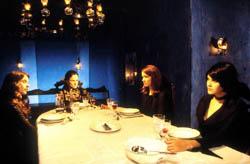The 3 Marias

The 3 Marias, a gritty 2002 Brazilian film directed by Aluizio Abranches, revisits the age-old theme of revenge, but with a delightful empowering twist. The film opens with haunting opening credits, and the story begins with a rather cryptic yet powerfully operatic scene. The plot then steamrolls forward, introducing the victims of unwelcome murder, and off we go. It’s a whirlwind tale of a woman, wronged by an ex-lover, who happens to be her late husband’s archenemy, imploring her three daughters to avenge the cruel and corrupt death of their father and two brothers. Filomena Capadocio (Marieta Severo) is greeted with the news of her husband and sons’ deaths and immediately springs into action passing on three commands to her three daughters: to find a hit man each to kill the three men who murdered their family.
The death of one of the characters (I will not give the details away) is quite powerful, reminiscent of the martyrdom of St. Lawrence. The film is rife with references to Christianity, specifically Catholic tradition and imagery, with the use of the number three and overt references to biblical tales.
The women in the film seem to represent female stereotypes, which, at first, was off-putting; I assumed these women would be portrayed more as superficial caricatures, but once the credits rolled, I was happily mistaken. Filomena plays the role of the forlorn widow, however, she exhibits a much stronger, empowered personality of a family matriarch. The oldest daughter, Maria Francisca (Julia Lemmertz), was introduced as a prissy, little lady who wears heels while traversing the difficult and rocky terrain of the desert. The middle daughter, Maria Rosa (Maria Luisa Mendonca), is seen as meek and emotional, and the youngest daughter is pigeonholed as a tough, stand-offish vixen with exposed cleavage and a penchant for hard looks. These superficial introductions to the characters are shattered, however, at the end of the film, when each of the girls exhibit qualities contrary to her stereotyped persona, which drives home the point that these women are not merely the “gentler” sex, but wholly humans.